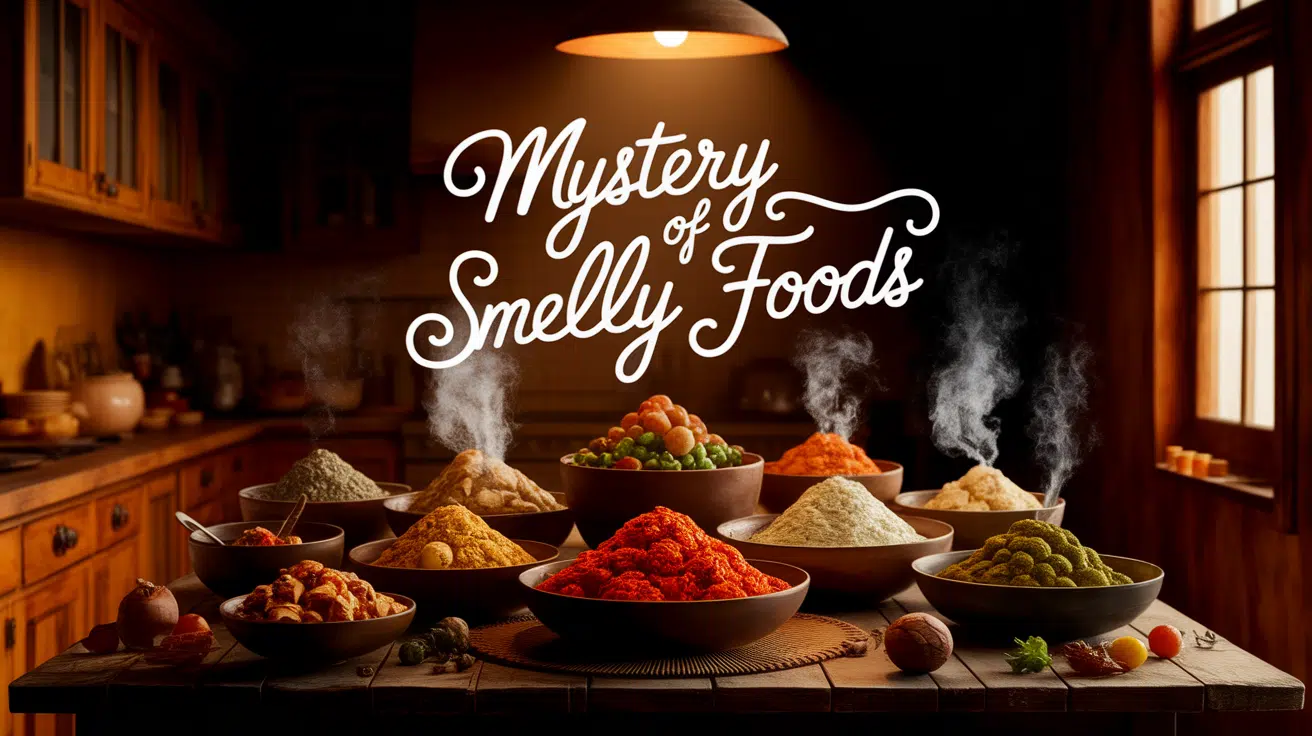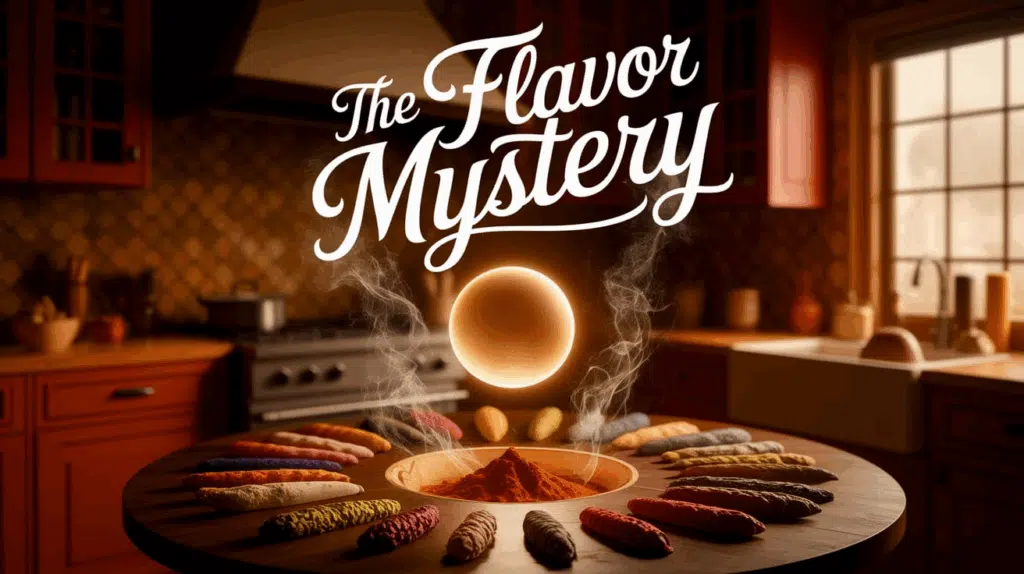Food can trick us. Have you ever held your nose while eating something smelly, only to find it tastes amazing? It’s a common problem for food lovers.
We avoid certain foods because they smell off-putting, missing out on incredible flavors. The disconnect between smell and taste creates confusion for our senses.
But here’s the interesting part: some foods that make you wrinkle your nose can actually make your taste buds sing.
This odd contrast happens because smell and taste work together in complex ways. Our brains process these signals differently, creating surprising results.
In this post, we’ll show you foods that prove the nose-taste puzzle exists, and explain the science behind why some things taste better than they smell.
Unpacking the Riddle: What Tastes Better Than It Smells?
The classic answer is “your tongue.” That’s because your tongue helps you taste all sorts of flavors, but if you try to smell your tongue, there’s really nothing there. It’s a clever play on how taste and smell are connected, but not always the same.
But let’s go a bit deeper. Taste and smell both help us enjoy food, but they pick up on different things.
Your nose catches scents that float in the air, while your tongue senses flavors like sweet, salty, sour, bitter, and umami.
Sometimes, these senses don’t match up. That’s why certain foods can smell pretty bad but taste amazing once you get past the odor.
So, the riddle isn’t just a joke—it’s a reminder that taste and smell don’t always agree. Sometimes, the best flavors are hiding behind the weirdest smells!
The Interesting Science Behind the Riddle’s Response

Taste and smell are like best friends—they work together to help us enjoy food and stay safe. When you eat, your taste buds on your tongue pick up flavors like sweet, salty, sour, bitter, and umami (which is a savory taste).
These taste buds send signals to your brain, telling you what you’re tasting. At the same time, your nose smells the food by catching tiny molecules in the air.
Special cells in your nose send messages to your brain about what you’re smelling.
Here’s the cool part: your brain mixes these signals from your tongue and your nose to create the full flavor of your food. That’s why food tastes bland when you have a stuffy nose.
Taste and smell are both important for enjoying meals and even for keeping us safe from things that might be spoiled or dangerous to eat.
Riddles That’ll Make You Think: Other Mind-Bending Food Questions

-
I smell like rotten fish, but my taste is considered a delicacy: Surströmming
-
I have a strong, pungent aroma, but my creamy texture and flavor are adored by many: Blue cheese
-
I’m fermented and stinky, but those who try me love my tangy flavor: Kimchi
-
I might smell like sulfur, but my unique taste makes me a breakfast favorite in some places: Natto
-
I have a strong odor, but once cooked, my flavor is loved by many around the world: Durian
-
I might smell earthy and strong, but my savory taste is the highlight of many meals: Miso
-
I stink when raw, but cooked, I turn into a delicious dish: Garlic
-
I have an overpowering smell, but I’m delicious when roasted or prepared well: Brussels sprouts
-
I smell like rotten eggs, but my flavor is rich and savory when prepared correctly: Eggplant
-
I may smell strong when fermenting, but my taste is cherished in many cuisines: Sauerkraut
-
I can smell like dirt, but my rich, earthy taste is a favorite in stews and dishes: Beets
-
I have a sharp, bitter aroma, but my taste is surprisingly smooth and comforting: Olives
-
I smell like old socks, but my taste is loved in many French dishes: Tête de Moine cheese
-
I can have a strong, stinky odor, but my taste is buttery and sweet when roasted: Celeriac (celery root)
-
I might smell like feet, but my creamy texture and tangy flavor make me irresistible: Stinking Bishop cheese
-
I smell funky when fermented, but my flavor is a sought-after ingredient in sushi: Miso
-
My aroma might turn heads, but my flavor makes me a star in many Asian dishes: Durian
-
I have a strong smell, but when cooked, I offer a sweet and savory flavor: Onions
-
I can be pungent, but my taste is loved when baked into bread or savory dishes: Garlic
-
I have a strong odor, but my taste is mild and delicious in Mediterranean recipes: Feta cheese
-
I might smell like gym socks, but my taste is creamy and delicious on a cracker: Camembert cheese
-
I might smell sour, but my taste is bright and refreshing when pickled: Lemon zest
-
I smell pungent when raw, but my smoky flavor makes me an excellent addition to barbecue: Chipotle peppers
-
I smell strong, but my nutty and buttery flavor is the star of many dishes: Truffle
-
I can be smelly when cooked, but my rich flavor makes me the main attraction in pasta dishes: Anchovies
-
I have a tangy aroma, but my taste is beloved in many Asian dishes: Fermented tofu
-
I smell like vinegar, but my taste is a delightful addition to salads: Pickled onions
-
I might have a musty smell, but my rich flavor is loved on pizza or in pasta dishes: Gorgonzola cheese
-
I may smell of decay, but my flavor is incredibly sweet when ripened: Jackfruit
-
I smell strong when pickled, but my flavor enhances savory dishes beautifully: Pickled garlic
-
I may smell strong, but my sweet and tart flavor makes me a dessert favorite: Rhubarb
-
I can smell pungent when raw, but when fried, I offer a delightful crunch: Cabbage
-
I can have a strong, musty smell, but my flavor is a delightful surprise in sauces and stews: Shiitake mushrooms
The Mystery of Smelly Foods: Why Do They Taste So Good?

Some foods smell so strong, you might want to run away before you even taste them. But here’s the mystery: a lot of these stinky foods actually taste amazing once you give them a chance. Why is that?
It mostly comes down to science and tradition. Many smelly foods—like durian, stinky tofu, kimchi, and certain cheeses—get their powerful odors from the way they’re made. Fermentation and aging create special molecules called volatile compounds. These are what hit your nose with that strong smell, but they also help build deep, rich flavors that your taste buds love.
Culture plays a big part, too. In some places, these foods are family favorites and are eaten at celebrations or with special meals. People grow up loving the taste, even if the smell is a bit much at first.
Plus, some smelly foods are packed with nutrients and can be really good for you, like eggs, garlic, and fermented veggies.
So, while your nose might complain, your mouth might just thank you for being brave enough to try something new!
The Bottom Line
Food that smells bad but tastes good shows us how complex our senses can be. The science behind this odd mix helps us understand why our brain sometimes gets confused between what we smell and what we taste.
Next time you come across durian or blue cheese, give it a chance. Your taste buds might thank you despite what your nose tells you.
So what matters most in this flavor mystery? It’s about trying new things and going beyond first impressions. Our senses work together in amazing ways, often creating experiences we didn’t expect.
We hope this look at smelly-yet-tasty foods makes you think differently about your next meal. What food will you try next that might surprise you? Share your experiences in the comments below!
















